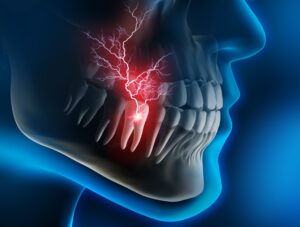 Nothing is worse than a toothache interrupting your day. According to the Centers for Disease Control and Prevention, 40% of adults have experienced tooth pain within the past year. Contrary to common belief, an occasional toothache is not normal. It’s actually a symptom of an underlying issue that can turn into a dental emergency. Here’s what might be causing your discomfort, depending on the type of pain you’re experiencing.
Nothing is worse than a toothache interrupting your day. According to the Centers for Disease Control and Prevention, 40% of adults have experienced tooth pain within the past year. Contrary to common belief, an occasional toothache is not normal. It’s actually a symptom of an underlying issue that can turn into a dental emergency. Here’s what might be causing your discomfort, depending on the type of pain you’re experiencing.
Types of Tooth Pain
Toothaches can come with no warning. Some may not be consistent, while others can gradually worsen. You should never try to wait out the pain, or you can be at risk of losing your tooth. Here are the most common types of tooth pain and what might cause them:
A Dull Ache
A dull, persistent ache can be caused by several factors, like:
- Object Caught in Teeth
- Object Caught in Gums
- Abscessed Tooth
- Teeth Grinding
Dental floss can remove an object caught in your teeth or gums to give you the relief you need. However, if your tooth is infected or you have a habit of grinding your teeth, you’re going to need to see your dentist for treatment.
Teeth Sensitivity
If drinking a glass of cold water or enjoying a hot cup of coffee makes you pucker your lips from sensitivity, many things can be the culprit, like tooth decay or enamel loss. Gum recession can also lead to sensitivity from exposed tooth roots. The issue will not go away without treatment. Your dentist will identify the cause to determine an effective treatment, like a filling or gum disease therapy.
Sharp Pain
If you experience sharp pain when putting pressure on a tooth, you may have a fracture or other damage that’s not visible to the naked eye. Infections, failing restorations, and other issues can cause sharp, sudden pain. Your dentist will find the source of your discomfort to provide the right treatment, like fixing a cracked tooth with a dental crown or replacing an old restoration.
Throbbing Pain
A throbbing toothache is often caused by an infection deep within your tooth. Your discomfort will not go away if you don’t see a dentist. In fact, if your pain suddenly stops, your tooth may have died and will need to be extracted. A root canal can save an infected tooth and stop your pain.
Don’t ignore dental pain, contact your dentist right away for an appointment. They’ll provide the quick care you need to restore your dental, so a toothache will be the last thing on your mind.
About Dr. Anthony Dillard
Dr. Dillard earned his dental degree at the Baylor College of Dentistry and is committed to continuing his education to provide up-to-date dentistry. He specializes in Invisalign, sleep apnea therapy, and general dentistry. Request an appointment through his website or call his office at (972) 394-1492.
